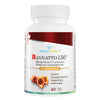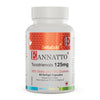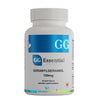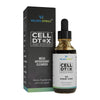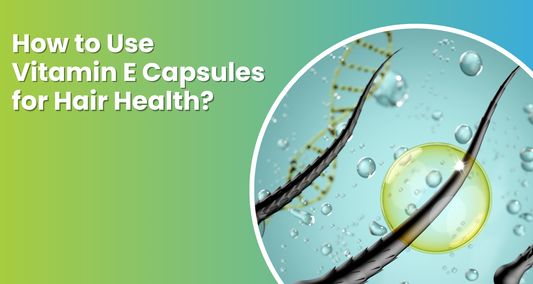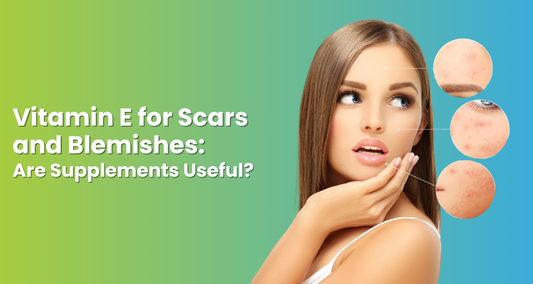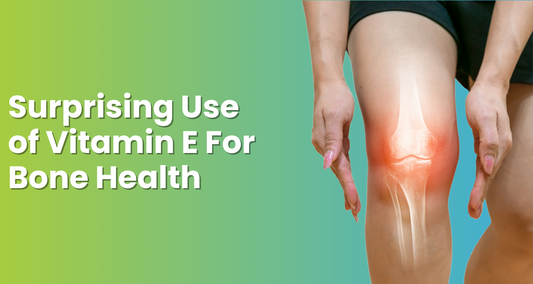Vitamins are essential in maintaining the proper functioning of our body, and the brain is no exception. As our control center, the brain requires a constant supply of vitamins to support our health. This blog will explain the significance of vitamins for good brain function and how to use them for optimal brain function.
What are Vitamins?

Vitamins are organic compounds that are essential in small amounts for the body's normal metabolic function but are not synthesized in sufficient quantities by the organism. Therefore, they must be obtained from the diet. Vitamins are crucial for various bodily functions, including growth, digestion, and nerve function.
There are two types of vitamins: water-soluble (not stored in the body and need to be replenished regularly) and fat-soluble (can be stored in the body's fatty tissues).
|
Vitamin Type |
Examples |
Key Functions |
|
Water-Soluble |
B-complex, C |
Energy production, immune function, iron absorption |
|
Fat-Soluble |
A, D, E, K |
Vision, bone health, antioxidant protection, blood clotting |
Also read: Complete Guide to Sources of Vitamin A B C D E and K
Among their numerous health benefits, specific vitamins play a significant role in maintaining vitamins for good brain function. For example, Antioxidant vitamins like Vitamin E Tocotrienols protect brain cells from damage by free radicals. While, B vitamins (especially B6, B9, and B12) contribute to the prevention of brain aging, memory enhancement, and the management of depression.
Consuming adequate vitamins and following a well-balanced diet are crucial for supporting brain health and cognitive function. Incorporating a variety of vitamins for good brain function into one's diet is fundamental for mental agility and overall well-being.
Also read: Essential Guide: What are Water Soluble Vitamins
1. Vitamin E - Best Vitamins for Brain Health

Vitamin E comes in two main forms: Tocopherols and Tocotrienols. Of these, research highlights Tocotrienols Vitamin E as the more potent form, offering unparalleled support against brain-related conditions. Vitamin E tocotrienol is celebrated for its powerful antioxidant capabilities, which may protect your brain cells from damage by free radicals.
Natural Sources of Vitamin E to Add to Your Diet
To boost your intake, consider these natural sources of Vitamin E:
- Nuts and seeds, like almonds and sunflower seeds, are top choices.
- Green leafy vegetables, such as spinach and kale, provide plant-based strength.
- Avocados, packed with Vitamin E and healthy fats, are great for overall brain well-being.
- Butternut squash and kiwi fruit also offer significant amounts of this vital nutrient.
Related reads: Vitamin A and Vitamin E for Skin: Glow & Youthfulness Boost
Vitamin E for Fatty Liver - How Much Vitamin E is Good for Your Liver?
The Comprehensive Guide on What Is Vitamin E Good For?
2. Vitamin B Complex for Optimal Brain Function
The Vitamin B complex is second on the list of vitamins for good brain function, as it uniquely contributes to optimal cognitive health. The vitamin B complex includes eight critical vitamins that play a significant role in maintaining overall health, especially brain health.
These vitamins work together to support energy production, aid in the synthesis of neurotransmitters, and maintain the integrity of nerve cells, among other functions. These essential nutrients include:
|
S. No. |
Name of the Vitamin |
Function |
|
1. |
B1 (Thiamine) |
It is vital for your brain's glucose metabolism, which is essential for energy. |
|
2. |
B2 (Riboflavin) |
This may help in energy production and fight oxidative stress in your brain. |
|
3. |
B3 (Niacin) |
Important for the repair of your DNA and maintaining brain cell health. |
|
4. |
B5 (Pantothenic Acid) |
Plays a role in synthesizing neurotransmitters, crucial for brain communication. |
| 5. |
B6 (Pyridoxine) |
Essential for the synthesis of neurotransmitters and brain development. |
| 6. |
B7 (Biotin) |
Supports your nervous system health and brain function. |
| 7. |
B9 (Folate) |
The key for your early brain development and maintaining mental clarity. |
| 8. |
B12 (Cobalamin) |
Necessary for nerve health and cognitive function. |
Natural Sources of Vitamin B
To boost your intake, consider these natural sources of Vitamin B:
- Include leafy greens and legumes for B9 to support your memory and focus.
- Consume eggs and dairy products, rich in B12, vital for your nerve health and cognitive processes.
- Opt for whole grains and meat to get plenty of B1 and B3, fueling your brain function.
- Add nuts and seeds to your diet, packed with Vitamin B6, to enhance your mood and brain health.
Supplementation might be necessary for some, especially those with dietary restrictions or certain health conditions. Before starting any supplement regimen, it's essential to consult with a healthcare provider, as they can help determine the proper dosage and ensure it doesn't interfere with any conditions or medications.
Also read: What is Vitamin B12 Good For? Essential For Health & Energy
The ABCs of Biotin: What Does Biotin Do for the Body?
Vitamin C: Powerful Antioxidant for Brain Health
Vitamin C is not only a powerful antioxidant but also one of the essential vitamins that are good for brain function. Its role in supporting brain health cannot be overstated, as it helps protect the brain against oxidative stress and plays a significant part in the synthesis of neurotransmitters, which are crucial for brain function.
Vitamin C aids in repairing and maintaining vital brain tissue, and its antioxidant properties help fend off the damage caused by free radicals. Thus, it contributes significantly to your brain health vitamin regimen.
Natural Sources of Vitamin C
To ensure you're getting enough Vitamin C, incorporating a variety of fruits and vegetables into your diet is key. Some of the richest natural sources include:
- Oranges and other citrus fruits: Well-known for their Vitamin C content, these delicious fruits are a great boost for brain health.
- Strawberries are a delicious and versatile fruit that is high in Vitamin C and perfect for adding to your breakfast or snack time.
- Bell peppers: Both red and green bell peppers are excellent sources of Vitamin C and can easily be incorporated into meals.
- Broccoli: This green vegetable is not only high in Vitamin C but also packed with fiber and other nutrients, making it a powerhouse for health.
- Kiwi: Often underrated, kiwi is a fruit that's rich in Vitamin C and can be a tasty snack or a great addition to fruit salads.
Focusing on these natural sources ensures that your diet supports optimal human brain function and health. If your diet lacks sufficient fruits and vegetables or has a higher need for Vitamin C due to stress, smoking, or illness, consider taking a Vitamin C supplement.
It's important to consult with a healthcare provider before starting any supplement regimen to determine the appropriate dosage and to ensure it aligns with your health needs.
Also read: An Ultimate Guide On What Does Vitamin C Do For Your Skin?
Other Brain Health Nutrients
To nurture your brain's health, adopting a holistic approach that includes a diverse range of nutrients is essential. Beyond the familiar vitamins for good brain function, several key nutrients stand out for their unique benefits in supporting brain health.
Adding Gingko Biloba, Omega-3 fatty acids, L-theanine, and Ginseng into your diet may offer improvements in memory, focus, mental clarity, and overall neuroprotection.
Learn how these best vitamins for brain health can positively influence your mental acuity and support long-term brain health, directly benefiting your journey toward a sharper and more vibrant mind.
1. Ginkgo Biloba
Gingko Biloba is a natural brain health supplements known for its ability to support memory and cognitive speed, making it one of the vitamins for good brain function. Its primary action is improving blood circulation in the brain, which helps enhance cognitive functions and memory.
Gingko Biloba is especially beneficial as you age, helping to combat age-related decline in brain function. Additionally, it has antioxidant properties that protect the brain from oxidative stress. Including Ginkgo Biloba in your diet can be a strategic choice to maintain optimal brain health.
2. Omega-3 Fatty Acids
Omega-3 fatty acids, particularly EPA and DHA, are crucial for brain health, serving as one of the vitamins that are good for brain function. These fatty acids are integral components of cell membranes in the brain and are essential for neuronal function.
Omega-3s are known to enhance cognitive functions, reduce inflammation, and are linked to a lower risk of brain aging and cognitive decline. Consuming foods rich in Omega-3s, like fatty fish or taking supplements, can support brain health and cognitive performance throughout life.
Also read: Omega 3 Fatty Acid Supplement Benefits & Guide
3. L-theanine
L-theanine, an amino acid found primarily in green and black tea, is praised as a brain health vitamin. It's known for its ability to promote relaxation without drowsiness, improve focus, and enhance overall cognitive health.
L-theanine works by modulating aspects of brain function, promoting alpha-wave production in the brain, which is associated with a state of calm alertness. Incorporating L-theanine into your daily routine through tea consumption or supplements can help support a healthy, focused, and calm mind.
4. Ginseng
 Ginseng, particularly Asian ginseng, is recognized as one of the best vitamins for brain health due to its antioxidant and neuroprotective properties. It has been shown to improve cognitive functions, including memory, behavior, and mood.
Ginseng, particularly Asian ginseng, is recognized as one of the best vitamins for brain health due to its antioxidant and neuroprotective properties. It has been shown to improve cognitive functions, including memory, behavior, and mood.
Ginseng works by modulating neurotransmitter levels in the brain, reducing oxidative damage, and improving blood flow. This herb can be an excellent addition to your daily regimen to enhance mental performance and protect against cognitive decline.
Adding this nutrient to your diet can complement a balanced diet and contribute to your overall brain wellness and cognitive performance. Always consult with a healthcare provider before beginning any new brain health supplements to ensure it's appropriate for your health needs.
Further readings –
Top Foods That Fight Inflammation Naturally
What Vitamins Are Good for Hair Growth: Top Picks!
What is Vitamin E Good For? Understanding its Impact on Your Health
